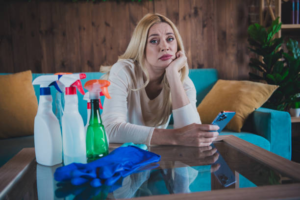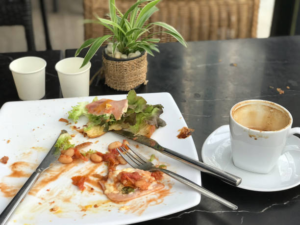Involving a weight-loss program that promises individuals fast weight loss One such program is Optavia. Its meal plans and structured method promise quick weight loss. But Optavia devastated my life in ways I never could have anticipated. What felt like a simple fix for my weight issues turned into a horrific struggle. So in this article, I am going to tell how Optavia changed my health, my mental stability and my life.
Why I Chose Optavia
At first glance, Optavia looked like the miracle solution I’d been searching for. Like so many others, I was lured in by the promise of quick weight loss, “feelings,” and a supportive community that would help guide me to success. But what I didn’t realize at the time was that behind the polished marketing and testimonials, there was a darker side—one that led me to say, without exaggeration, Optavia ruined my life.
I came across Optavia at a particularly low point. I felt unhappy with my weight, was emotionally vulnerable, and desperate for control. The idea of having pre-portioned meals, constant coaching, and a structured plan solved all my problems. It wasn’t. It created many more.
The Start of My Journey with Optavia

Initially, I noticed a few good changes. I started losing weight quickly. This was encouraging. I was calling it weight loss; the numbers on the scale were going down, and I thought I was doing it right. For the first couple of weeks, everything went fine, though I was noticing results.
But I was trapped in the mindset that this was “just part of the process.” Everyone else seemed to be doing great, so I assumed the problem was me. This is the hidden danger—Optavia ruined my life by making me doubt my instincts and ignore the signs my body was screaming at me.
The Physical Effects of Optavia
The weight loss was clear, but it had a cost. Fatigue was one of the first physical changes I observed. Even though I stuck to the programme and followed the meal plan to the letter, I was tired all the time. I was always exhausted, despite sleeping plenty of hours. It was this level of fatigue that hindered even the most basic day-to-day activities. I felt too drained to exercise, work, or spend time with friends.
Fatigue was also accompanied by vertigo. I often felt faint, particularly after eating. Concentrating at work became difficult, and I started feeling increasingly irritable. To this day, I still don’t know if it was the low-calorie intake, the lack of proper nutrition, something else, or a combination of all three, and I and my body just weren’t clicking the way they should be.”
Over the weeks, my weight loss eventually plateaued. At first I lost a considerable amount of weight, but it seemed my body was not keeping pace with the extreme restrictions the diet placed on me. I was eating far below my caloric needs, and I was lacking many of the micronutrients that had entered my system before.
The Emotional and Mental Toll
The emotional effects of Optavia were equally as harmful as the side effects. Initially, the weight loss was a massive boost to my confidence. I felt as if I was finally living my dream. But after I started the programme, I found myself obsessed with food, calories and how I looked. I started to dread every meal. The program’s strict guidelines made me feel that even if I were hungry or sick, I wouldn’t be able to deviate from the plan.
Perhaps the worst part is how Optavia ruined my life emotionally. I developed an intense fear of food, dreading meals outside the plan. Social events became anxiety-inducing. I stopped going out with friends, skipped family dinners, and isolated myself. Food was no longer fuel or enjoyment—it was a punishment.
I eventually fell into depression. The pounds lost that had felt so cleansing at first became a point of anxiety and obsession. I was afraid to eat and gain the weight back and began to see food as my enemy. I have too many high concerns about getting low-calorie intakes, which ended up ignoring my other health systems. I lost peace of mind and could not seem to strike a balance.
The Social and Personal Impact

I started turning down invites to social gatherings because I didn’t want to break from the rigid parameters of the programme. If I did eat anything outside the plan, even just a tiny treat, I also felt guilty. So this guilt grew bigger and bigger. It was like I was at war with myself — on one hand, I wanted to LIVE and enjoy life, and on the other hand, I wanted to stick to the Optavia rules.
As the weeks stretched into months, I began to notice how much I had emotionally checked out from many of my social circles. I would rather not have to explain my diet to people, and I would rather not have to deal with the judgement or questions. I withdrew and realized that my life outside of food and weight loss had become infinitesimal.
The Long-Term Effects of Optavia

Following the programme worked for me, but when I fell off the programme, I struggled to get back to healthy eating, and I lost the weight indeed. I had trained my body to eat unsustainably. I had a hard time moderating, and I started binge eating after putting myself on a diet for so long. I was sick of the vicious cycle of extreme dieting and then overeating.
The mental toll has been no less profound. My eating-behaviour obsession continued long after I stopped the programme. I was always fighting the temptation to restrict myself again, but I knew it wasn’t healthy. “ I had broken my relationship with food, and it has taken many years to heal it.
Optavia Ruined My Life: What I Wish I Had Known
I hope that if I could go back, I wish I would have been aware of the dangers of being on a restrictive diet like Optavia. It may have seemed like a dream to lose the weight so quickly, but the physical, emotional and social consequences were worse than I could ever have imagined. GM: I have never met you, but I truly believe you ruined my life with your Optavia diet programme. It alienated me and exhausted me, body and mind, and if you have read my posts on nutrition, you know that spiralled into a cycle of poor eating behaviour.
However, I want to caution you if you are thinking of trying Optavia or a similar diet. Litting these diets forgets about the longer-term effects calorific choice can have. You need to find a method to lose weight but also a method that you can use to maintain your health in the long term.
Conclusion
Optavia destroyed my life in so many ways, but I am learning to heal. I’m trying to rebuild a healthy relationship with food and my body. It’s not easy, and it doesn’t happen overnight, but I’ve now shifted my focus from extreme restriction to balance. I’ve discovered that weight loss isn’t worth losing my mental health, social life or general joy.
Optavia ruined my life, but it also taught me a lesson I’ll never forget: health isn’t a product you can buy. It’s a journey you take—one meal, one day, one breath at a time. If you’re struggling, speak up. If you’re recovering, keep going. And if you’re on the fence, listen to your gut. It’s wiser than any coach will ever be.
FAQs
1. Is Optavia safe for long-term use?
Many experts question the safety of such a restrictive, low-calorie program. It’s best to consult a licensed healthcare provider before starting.
2. Why do people say “Optavia ruined my life”?
Because the program has caused mental, physical, and financial distress for many users who expected sustainable results but ended up harmed.
3. What should I do if I had a bad experience with Optavia?
Focus on recovery. Seek help from professionals like registered dietitians and therapists to rebuild your health and mindset.
4. Are there better alternatives to Optavia?
Yes—whole-food-based nutrition, intuitive eating, and personalized wellness programs designed by experts are healthier and more sustainable.
5. How can I recover from diet damage?
Start by being kind to yourself. Reconnect with your body’s natural cues, eat nourishing food, and seek support from professionals or recovery communities.
